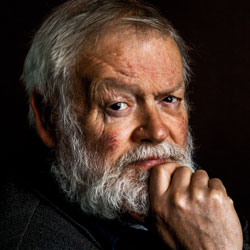for Bel Mooney
Imagine a shallow glass box
About nine inches by seven,
She writes, a bundle of papers
Inside, tied with brown ribbon,
Photos of our battlefield trip
Interleaved with war poems
She has copied out in longhand.
A shrapnel ball (in cellophane
For protection) nestles there
And rusty shrapnel casing
And the chestnuts and acorns
We examine in one photo.
In another, under a cross,
What can we be looking at?
Embroidered postcards evoke
Men who fought and loved and died,
She says. I who wrote the poems
Imagine a shallow glass box.
Notes on the Poem
Let's visit again the poem "Glass Box" from The Stairwell by Michael Longley, winner of the 2015 Griffin Poetry Prize. This poem both hearkens back and looks from a present day perspective at historical events that have informed a significant part of Longley's work - the First World War. The poem "Glass Box" is dedicated to Bel Mooney, a British journalist and broadcaster who has most recently written columns and articles for the tabloid newspaper Daily Mail. It was for that publication that she wrote a touching account of retracing her grandfather's wartime path. The tour she took to visit the scenes of her grandfather's World War I experiences was orchestrated by The War Poets Association, an organization that "promotes interest in the work, life and historical context of poets whose subject is the experience of war." Michael Longley is the only living poet among those whose biographies are showcased on the War Poets web site. Both Longley's poem and Mooney's reflections in her article circle back repeatedly to the simultaneously heartbreaking and spirit bolstering importance of things - letters and pictures are both fragile and vital. Postcards combine letters and pictures, and interestingly, both pieces gaze longingly at them. Mooney remembers: "As a child, I played with the silken postcards he’d sent her from France ..." Longley carefully points out: "Embroidered postcards evoke Men who fought and loved and died, She says." ... perhaps depicting the very same postcards to which Mooney refers. Mooney mentions repeatedly how significant poetry was to her in pulling together her respectful and sorrowful response to revisiting her grandfather's experiences. In turn, Longley acknowledges the poet's essential role in delicately preserving wartime memories - the physical mementoes, but also the feelings - in this final line: "I who wrote the poems Imagine a shallow glass box."
